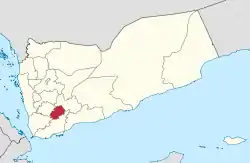Dhale Governorate
Dhale (Arabic: الضالع Aḍ-Ḍāliʿ) is one of the Yemeni governorates that was created after the unification of Yemen. The population of the province accounts for 2% of the total population of the republic.[3] The governorate is divided into 9 districts. The city of Dhale is the administrative centre of the province. Dali is one of the governorates that is known for agriculture, and most of the population works in that industry. The most important agricultural crop is coffee. The province also contains mineral resources, most importantly talc, which is used in the manufacture of paper, paint, cosmetics and pesticides. This governorate is also home to the Damt hot-springs (Ḥamam-Damt), a popular tourist attraction. One of the ancient cities in the region is Juban, a city famous for its castle and the historic Mansuria school, built by the Tahrids. The climate in Dhale governorate is mostly temperate throughout the year.[4]
Dhale
الضالع | |
|---|---|
Governorate | |
 | |
| Country | |
| Region | Aden Region |
| Seat | Dhale |
| Government | |
| • Governor | Major General Ali Muqbel Saleh[1] |
| Area | |
| • Total | 4,786 km2 (1,848 sq mi) |
| Population (2011)[2] | |
| • Total | 669,000 |
| • Density | 140/km2 (360/sq mi) |
History
Before the unification of Yemen in 1990, Dhale governorate consisted of nine districts, five in South Yemen and four in North Yemen. The South Yemeni districts, Al Hussein, Al Azariq, Ash Shu'ayb, Jahaf, and Ad Dhale'e, were all in the country's Lahij Governorate. The North Yemeni districts were Juban, part of Al Bayda Governorate, Al Husha, part of Taiz Governorate, and Damt District and Qa'atabah District, both part of Ibb Governorate. 70% of the area of today's Dhale Governorate was in North Yemen in 1989.
Geography
Dhale Governorate is 245 kilometers away from the Yemeni capital Sana'a.
Adjacent governorates
- Al Bayda Governorate (north)
- Ibb Governorate (west)
- Lahij Governorate (south)
- Taiz Governorate (southwest)
Districts
Dhale Governorate is divided into the following 9 districts. These districts are further divided into sub-districts, and then further subdivided into villages:
| Name | Population[5] | Governorate before unification |
|---|---|---|
| Ad Dhale'e District | 80,213 | Lahij, South Yemen |
| Al Azariq District | 37,295 | Lahij, South Yemen |
| Jahaf District | 22,897 | Lahij, South Yemen |
| Al Hussein District | 37,118 | Lahij, South Yemen |
| Ash Shu'ayb District | 38,261 | Lahij, South Yemen |
| Al Husha District | 60,178 | Taiz, North Yemen |
| Juban District | 73,960 | Al Bayda, North Yemen |
| Damt District | 60,994 | Ibb, North Yemen |
| Qa'atabah District | 91,206 | Ibb, North Yemen |
References
- "Yemeni president appoints five new ministers in cabinet reshuffle". 24 December 2017.
- "Statistical Yearbook 2011". Central Statistical Organisation. Archived from the original on 9 October 2012. Retrieved 24 February 2013.
- Central Statistical Organisation of Yemen.Statistic Yearbook 2013 of Yemen Archived 12 September 2015 at the Wayback Machine. The fields in the population.xls file are decimals (though they appear as whole numbers). To get the figures in the table, they were multiplied by 1000. Accessed 13 January 2016.
- "About Dali province". Archived from the original on 2016-03-04. Retrieved 2016-03-10.
- "Districts of Yemen". Statoids. Retrieved October 17, 2010.